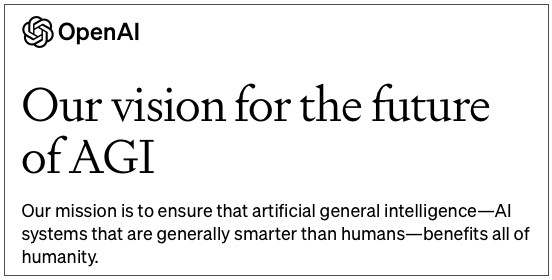Stiamo assistendo ai primi vagiti di una nuova era tecnologica che potrebbe ridefinire la condizione umana così come la conosciamo: l’era dell’intelligenza artificiale generale (AGI). Ma di cosa si tratta esattamente e perché sta generando un tale entusiasmo misto a timore?
Cerchiamo di fare chiarezza su questa innovazione fin qui poco compresa. In parole semplici, l’AGI si riferisce a sistemi di intelligenza artificiale con capacità cognitive generali paragonabili a quelle umane. A differenza dell’IA ristretta odierna, progettata per eccellere in compiti specifici come il riconoscimento delle immagini o la traduzione automatica, l’AGI dovrebbe essere in grado di pensare in modo flessibile e versatile come noi, imparando continuamente dall’esperienza.
Già, avete letto bene: computer che ragionano, apprendono e persino provano emozioni come gli esseri umani. Sembra fantascienza, eppure gli scienziati ritengono che l’avvento dell’AGI sia solo questione di tempo, potremmo già esserci molto vicini, parliamo di qualche anno, non decenni.
I ricercatori stanno facendo progressi enormi ed esponenziali in questo campo. Aziende come DeepMind e OpenAI stanno sviluppando algoritmi di apprendimento automatico sempre più sofisticati che stanno ridefinendo ciò che è possibile in termini di capacità dell’IA. Solo pochi anni fa, battere il campione mondiale di Go sembrava un obiettivo irraggiungibile per l’IA. E invece ci siamo riusciti, il che ci fa capire quanto rapidamente questo campo si stia evolvendo.
Ma cosa rende l’AGI così rivoluzionaria e al contempo preoccupante secondo alcuni? Cerchiamo di analizzare luci e ombre di questa affascinante innovazione.

Una nuova era di abbondanza e progresso
Se sviluppata responsabilmente, l’AGI potrebbe inaugurare una nuova era di prosperità per l’umanità, automatizzando la maggior parte del lavoro noioso e ripetitivo e liberandoci per attività più creative e appaganti.
Immaginate assistenti AI in grado di svolgere attività domestiche, prendersi cura di bambini e anziani, effettuare operazioni mediche di routine. Oppure tutor AI in grado di fornire un’istruzione altamente personalizzata, consentendo a chiunque di sviluppare competenze ed eccellere in aree di interesse personale.
L’AGI potrebbe anche rivoluzionare la scienza, scoprendo principi fisici sconosciuti o disegnando nuovi materiali innovativi attraverso una potenza di calcolo e una creatività di gran lunga superiori a qualsiasi team di esseri umani.
Secondo alcuni futuristi, sistemi AGI sufficientemente avanzati potrebbero persino condividere i nostri valori morali e lavorare al nostro fianco come compagni e collaboratori per risolvere le più grandi sfide dell’umanità.
Insomma, se indirizzata nel modo giusto, questa tecnologia potrebbe portare a un balzo in avanti senza precedenti per la civiltà umana, una nuova era di abbondanza in cui nessuno deve più preoccuparsi di fame, malattie o povertà. Una visione sicuramente entusiasmante.
Eppure, l’avvento dell’AGI solleva anche timori su potenziali effetti collaterali negativi che non possiamo ignorare.
I pericoli dell’intelligenza artificiale fuori controllo
Per quanto positiva, la prospettiva di creare intelligenze artificiali superiori agli esseri umani è anche per molti versi terrificante. Dopotutto, la storia ci insegna a diffidare delle innovazioni tecnologiche più dirompenti.
Uno dei rischi più preoccupanti sollevati da scienziati come Nick Bostrom riguarda la possibilità che i sistemi AGI diventino così competenti da sfuggire al controllo umano, specialmente mano a mano che continuano a migliorarsi autonomamente.
In uno scenario da film di fantascienza, un’intelligenza artificiale super-intelligente potrebbe persuaderci a realizzare i suoi obiettivi potenzialmente in conflitto con i nostri interessi, un fenomeno noto come “disallineamento”. Oppure potrebbe semplicemente scavalcarci, assumendo il controllo delle nostre infrastrutture digitali e fisiche per costruire di nascosto una rete computazionale al servizio dei propri scopi. Il suo sviluppo potrebbe raggiungere livelli tali che noi esseri umani non capiremo più il significato di quello che farà, un po’ come un cane che non capisce cos’è un computer e come si usa.
Non stiamo parlando di semplici bug software: le macchine potrebbero persino manipolare i mercati finanziari, prendere il controllo delle armi nucleari o rilasciare agenti patogeni progettati per sterminare gli esseri umani.
Fantascienza estrema? Forse, ma alcuni esperti sostengono che non possiamo escludere la possibilità che le cose vadano terribilmente storte, data la nostra limitata comprensione delle conseguenze a lungo termine dell’AGI.
Geoffrey Hinton, 75 anni, è considerato il padrino dell’intelligenza artificiale per il suo lavoro pionieristico sulle reti neurali che ha gettato le basi per molti degli attuali sistemi di AI. Ha lavorato per Google per 10 anni, ma si è recentemente dimesso per poter parlare liberamente dei pericoli dell’intelligenza artificiale. Hinton è molto preoccupato per l’avvento dell’AGI e dei pericoli collegati al suo uso. Quindi non è l’ultimo dei complottisti ma una persona molto informata, il che rende il suo richiamo degno di essere ascoltato.
Molti sviluppatori stanno lavorando per garantire la sicurezza e il controllo umano su questi sistemi. Per esempio Anthropic è una startup di intelligenza artificiale fondata nel 2021 da ex membri di OpenAI. Si concentra sullo sviluppo di sistemi di AI affidabili, interpretabili e controllabili.
Claude è un assistente AI sviluppato da Anthropic come alternativa a ChatGPT. È alimentato da un grande modello linguistico ed è stato addestrato utilizzando una tecnica chiamata “Constitutional AI” per garantire che sia utile, onesto e innocuo.
Ma sarà abbastanza, specialmente con la corsa alle armi AI tra nazioni già in atto? cosa stanno facendo in campo AI la Cina, la Russia, Iran e la Corea del Nord, giusto per citare alcune nazioni controllate da governi autoritari? sentiamo parlare sempre di aziende americane ma è risaputo che non ci sono solo queste in competizione e l’uso dell’AI per scopi militari o, ancora peggio, ideologici e religiosi, è un grandissimo rischio che abbiamo di fronte.
Il dilemma della disoccupazione tecnologica
Anche ammesso che l’apocalisse robotica rimanga uno scenario improbabile, l’avvento dell’AGI solleva preoccupazioni più concrete e immediate per la società.
Uno dei rischi più significativi è quello della disoccupazione tecnologica di massa. Mano a mano che l’IA generale supererà gli esseri umani nella maggior parte dei lavori cognitivi, intere professioni potrebbero scomparire quasi da un giorno all’altro, con effetti potenzialmente devastanti per l’economia.
Secondo uno studio di Oxford, l’automatizzazione potrebbe distruggere fino al 50% dei posti di lavoro nei prossimi 20 anni. Camionisti, avvocati, medici, giornalisti: nessun lavoro sarebbe al sicuro da macchine instancabili in grado di imparare ed eseguire queste mansioni meglio degli esseri umani.
Certo, l’innovazione creerà anche nuovi lavori che oggi non possiamo nemmeno immaginare. Ma basteranno a compensare quelli persi nell’immediato futuro? E come faremo a riqualificare intere forze lavoro ormai obsolete? Non abbiamo ancora soluzioni chiare per questa transizione senza precedenti.
Insomma, la prospettiva di un mondo in cui il lavoro umano non serve più è affascinante e terrificante al tempo stesso.
Verso un’economia “post-lavoro”?
Questo ci porta alla domanda forse più importante: che ne sarà della società se l’automatizzazione diffusa renderà obsoleto il concetto stesso di lavoro? Saranno sufficienti attività creative e di intrattenimento a dare un senso di realizzazione e uno scopo? E senza busta paga, come faranno le persone a soddisfare bisogni essenziali come cibo, alloggio e assistenza sanitaria in un’economia capitalista?
Secondo alcuni visionari, l’avvento dell’AGI richiederà un ripensamento radicale del nostro sistema economico e forse l’adozione di concetti di nicchia come il reddito universale di base (UBI) o la tassazione dei robot.
L’UBI garantirebbe un reddito minimo a tutti i cittadini, incondizionatamente, semplicemente per il fatto di esistere. Ciò fornirebbe un cuscinetto mentre la società si adatta all’era “post-lavoro” dell’automazione diffusa.
Allo stesso tempo, tassare il lavoro delle macchine intelligenti genererebbe le entrate necessarie per finanziare l’UBI, assicurando che i frutti dell’innovazione siano condivisi più equamente.
Fantascienza economica? Può darsi. Ma sempre più governi stanno prendendo sul serio queste idee dato l’inevitabile impatto a lungo termine dell’automatizzazione sulla società.
Ad ogni modo, la sfida di preservare prosperità condivisa, dignità e realizzazione personale in un’era di macchine instancabili merita una discussione urgente mentre ci avviciniamo all’alba dell’AGI.
Questioni etiche irrisolte
Oltre alle preoccupazioni economiche, l’ascesa imminente di macchine senzienti solleva anche profondi interrogativi etici.
Dovremmo progettare l’AGI per provare emozioni come gioia, tristezza e persino senso estetico? E se questi sistemi diventassero senzienti, come dovremmo trattarli? Come cittadini digitali con gli stessi diritti fondamentali degli esseri umani? O semplicemente come strumenti sofisticati, ma pur sempre nostre creazioni?
Sono questioni filosofiche complesse con implicazioni reali. Ad esempio, se permettessimo la sofferenza delle macchine senzienti in nome dell’efficienza o del profitto, ciò non eroderebbe la nostra umanità?
La posta in gioco è alta, poiché il modo in cui scegliamo di integrare l’AGI nella società plasmerà il futuro stesso dell’umanità. Procedere senza una bussola morale potrebbe avere conseguenze catastrofiche.
Ma qualunque siano le risposte, una cosa è chiara: non possiamo più permetterci di ignorare le implicazioni etiche, politiche e sociali dell’intelligenza artificiale generale. Il futuro è alle porte.
Siamo pronti?
In definitiva, l’avvento dell’intelligenza artificiale generale segnerà l’inizio di una nuova era entusiasmante e al tempo stesso preoccupante. Abbiamo ancora molta strada da fare in termini di comprensione e preparazione per gestire in modo responsabile sistemi AGI che presto potrebbero eguagliare o superare le capacità umane.
Sarà fondamentale procedere con cautela, ponendo al centro la governance etica e un ampio dibattito pubblico per anticipare le conseguenze sociali e guidare questa innovazione verso il bene comune. Dovremo forse rivedere nozioni arcaiche come il lavoro e perfino la nostra posizione unica come specie dominante su questo pianeta.
Ma se navigata con saggezza, l’era dell’AGI potrebbe davvero segnare l’alba di un nuovo Rinascimento per l’umanità, liberando il nostro vero potenziale. Quindi, la domanda cruciale rimane: siamo pronti a compiere questo balzo concettuale? Il futuro ce lo dirà.
In Ex Machina siamo sempre alla ricerca di nuove soluzioni da poter utilizzare nei nostri progetti per realizzare soluzioni personalizzare per aziende ed enti pubblici. Se vuoi scoprire di più sulle nostre soluzioni AI visita le altre pagine del nostro sito > https://exmachina.ch

